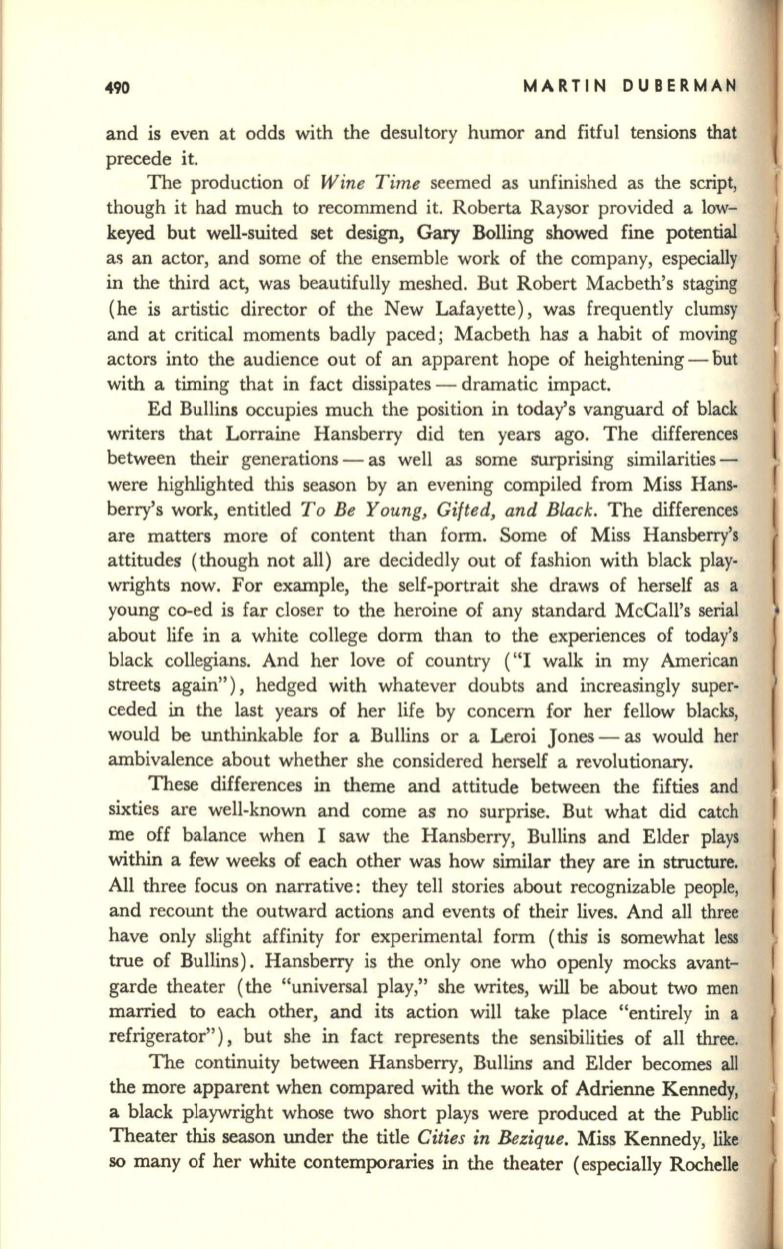
490
MARTIN DUBERMAN
and is even at odds with the desultory humor and fitful tensions that
precede it.
The production of
Wine Time
seemed as unfinished as the script,
though it had much to recommend it. Roberta Raysor provided a low–
keyed but well-suited set design,
Gary
Bolling showed fine potential
as an actor, and some of the ensemble work of the company, especially
in the third act, was beautifully meshed. But Robert Macbeth's staging
(he is artistic director of the New Lafayette), was frequently clumsy
and at critical moments badly paced; Macbeth has a habit of moving
actors into the audience out of an apparent hope of heightening - out
with a timing that in fact dissipates - dramatic impact.
Ed Bullins occupies much the position in today's vanguard of black
writers that Lorraine Hansberry did ten years ago. The differences
between their generations - as well as some surprising similarities–
were highlighted this season by an evening compiled from Miss Hans–
berry's work, entitled
To Be Young, Gifted, and Black.
The differences
are matters more of content than fonn. Some of Miss Hansberry's
attitudes (though not all) are decidedly out of fashion with black play–
wrights now. For example, the self-portrait she draws of herself as a
young cooed is far closer to the heroine of any standard McCall's serial
about life in a white college donn than to the experiences of today's
black collegians. And her love of country ("I walk in my American
streets again"), hedged with whatever doubts and increasingly super–
ceded in the last years of her life by concern for her fellow blacks,
would
be
unthinkable for a Bullins or a Leroi Jones - as would her
ambivalence about whether she considered herself a revolutionary.
These differences in theme and attitude between the fifties and
sixties are well-known and come as no surprise. But what did catch
me off balance when I saw the Hansberry, Bullins and Elder plays
within a few weeks of each other was how similar they are in structure.
All three focus on narrative: they tell stories about recognizable people,
and recount the outward actions and events of their lives. And all three
have only slight affinity for experimental form (this is somewhat less
true of Bullins). Hansberry is the only one who openly mocks avant–
garde theater (the "universal play," she writes, will be about two men
married
to
each other, and its action will take place "entirely in a
refrigerator"), but she in fact represents the sensibilities of all
three.
The continuity between Hansberry, Bullins and Elder becomes all
the more apparent when compared with the work of Adrienne Kennedy,
a black playwright whose two short plays were produced at the Public
Theater this season under the title
Cities in Bezique.
Miss Kennedy, like
so many of her white contemporaries in the theater (especially Rochelle
~
I
l
l
I
I
I
I


